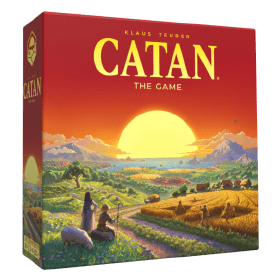CATAN The Settlers of Catan, Die Siedler von Catan, Les Colons de Catane
 Publicat inicialment a Alemanya el 1995 com Die Siedler von CATAN, llavors en anglès com The Settlers of CATAN el 1996, CATAN celebra el seu 25è aniversari el 2020.
Publicat inicialment a Alemanya el 1995 com Die Siedler von CATAN, llavors en anglès com The Settlers of CATAN el 1996, CATAN celebra el seu 25è aniversari el 2020.
Per començar la partida, construeixes el tauler utilitzant llosetes de terreny hexagonals. Catan ha nascut - una bonica illa amb muntanyes, pastures, turons, camps i boscos, envoltada pel mar.
Cadascun de vosaltres col·loca dues petites cases en espais on es troben tres llosetes de terreny. Són els vostres poblats inicials.
I ací comença això. El jugador inicial tira dos daus. Un "11"! Cada hexàgon de terreny està marcat amb un número. Cada jugador que tingui un poblat adjacent a un hexàgon de terreny marcat amb el número que ha sortit als daus rep un recurs produït per aquest haxàgon. Els turons produeixen maons, els boscos produeixen fusta, les muntanyes produeixen mineral, els camps produeixen cereal, i les pastures produeixen llana.
Utilitzes aquests recursos per expandir-te arreu de Catan: construeixes carreteres i nous poblats o millores els teus poblats a ciutats. Per exemple, una carretera costa 1 maó i 1 fusta. Si no tens els recursos necessaris, pots adquirir-los mitjançant l'intercanvi amb els teus oponents.
Cada poblat val 1 punt de victòria i cada ciutat 2 punts. Si t'expandeixes intel·ligentment, pots ser el primer jugador d'arribar a 10 punts de victòria i així guanyar la partida!
Nombre de jugadors: 3 - 4
Durada de la partida: 36 mn
Complexitat: 2 / 5
Juga a CATAN i 1229 a altres jocs en línia.
No és necessari descarregar res - juga directament des del navegador web.
Amb les teves amistats i milers de jugadors del món sencer.
De franc.

Juga a CATAN i 1229 a altres jocs en línia.
No és necessari descarregar res - juga directament des del navegador web.
Amb les teves amistats i milers de jugadors del món sencer.
De franc.

Resum de les regles
Objective
Get resources to buy various buildings and development cards, and try to be the first player to reach 10 points (or 13 in case of City & Knights)
Setup
- The board consists of hills (brick), forest (lumber), mountains (ore), fields (grain), pasture (wool) and a desert (nothing) at random places.
- Each terrain except the desert has a number of 2-12 on it. The desert starts with the robber on it.
- Each player places 2 settlements and 1 road next to each settlement on the board, then they receive resources for each terrain around the second settlement.
Gameplay
Rolling for resource production (obligatory): On your turn, roll 2 dice and calculate the sum.
- The terrains with that number produce resources for all players who have settlements or cities next to them (if the robber isn't blocking them): 1 resource per settlement and 2 per city.
- If you roll a 7, no one gets any resources and players with 8 resources or more must discard half of them (rounded down). You must move the robber to a new terrain and steal 1 random resource from a player who has a settlement or city next to that terrain.
Trading (optional): during your turn you can trade resources
- with all other players (domestic trade)
- with the bank (maritime trade) at the standard rate of 4 identical resources for 1 or at a preferential rate of a harbour if you have a settlement next to it.
Building (optional): finally, you can build roads and settlements, upgrade settlements to cities or purchase a development card by paying the resources needed.
- Roads must connect to the initial settlements and cost 1 brick + 1 lumber (worth 0 points)
- Settlements must be connected by roads to existing settlements (except at start) and cost 1 brick + 1 lumber + 1 wool + 1 grain (worth 1 point)
- Cities replace an existing settlement and cost 3 ore + 2 grain (worth 2 points)
- Development cards (unavailable in Cities & Knights) cost 1 ore + 1 wool + 1 grain and include
- 14 Knight cards that allow to move the robber to another terrain and steal a resource
- 2 Road Building cards allowing extra roads to be built
- 2 Year of Plenty cards providing two free resources of choice
- 2 Monopoly cards giving all other players that help gathering resources or building road•s
- 5 Victory Point cards
You can play a development card at any time during your turn, even before rolling the dice, as long as it was bought on a previous turn and is not a victory card.
Scoring
- Settlements: each is worth 1 victory point.
- Cities: each is worth 2 victory points (1 Point from the settlement + 1).
- Victory Point cards: some development cards are worth 1 victory point. They are kept hidden until you have sufficent points to win.
- Largest Army: the player who has played the most knight cards at any time (at least 3) gets the largest army card which is worth 2 points. No largest army in C&K.
- Longest Road: the player with the longest continuous road at any time (at least 5 segments) gets the longest road card which is worth 2 points.
If there is a tie, the original owner keeps the achievement cards.
End of Game
If a player has 10 or more victory points during their turn (including victory points cards), they reveal them and the game ends with their victory. For Catan Cities & Knights, a player needs 13 or more victory points to win.
Variants
- Easy Start: Players reroll any 7s they obtain in their first 2 turns. With the Cities & Knights expansion, the event dice is not rolled during these turns as well.
- Friendly Robber (Base Game only): The robber may not move to a terrain that is adjacent to a settlement of a player with only 2 victory points. If there is no valid terrain, the robber moves to the desert and the resource card cannot be taken from such players.
Cities & Knights
Event Dice
- An additional event dice is rolled each turn.
- If it shows a ship (3 faces), the barbarian ship moves 1 space closer to Catan. If it reaches the last space (7th), the barbarians attack.
- If it shows a city gate (blue/green/yellow), players draw a progress card if the color of the gate and the red dice match their chart.
- Each player can have up to 4 Progress Cards at a time. Victory Point cards are immediately played and do not count. Others can be played similar to Development cards.
- When the barbarians attack, they have 1 strength per city/metropolis owned by all players; The defending army have strength equal to the value of all active knights.
- If the barbarians are stronger, they pillage a city of the player with the lowest value of active knights, reducing it to a settlement. This also destroys any city walls under it.
- If the defending army is equal or stronger, the player with the highest value of active knights (non-tied) gains a "Defender of Catan" victory point card, which is worth 1 victory point. If there is a tie, the tied players gain a progress card each instead.
- Regardless of the result, the barbarian ship is reset and all knights become inactive.
Cities
- When a city produces wool/lumber/ore, replaces a resource they produce with a commodity (cloth/paper/coin) instead.
- Two new items can be built:
- City Walls must be under an existing city without one and cost 2 brick (worth 0 points). A player can have at most 3 city walls, and each increases the maximum number of cards they can safely hold when a 7 is rolled by 2.
- Knights must be connected by roads and cost 1 wool + 1 ore (worth 0 points). They start inactive at value 1, but they can be promoted with 1 wool + 1 ore (+1 value, up to 2) or activated with 1 grain.
- Active Knights may perform 1 action on your turn regardless of strength. This can be moving it along your roads to another intersection, moving it onto a weaker opponent knight (forcing it to move or removing it), or chasing away a robber adjacent to it (as per playing a knight). They become inactive afterwards.
- Cities can be developed in trade (yellow)/politics (blue)/or science (green) by paying 1 cloth/paper/coin per improvement level.
- The 3rd improvement provides a power each: trade 2 of the same commodity for a resource once per turn (trade); may promote knights to value 3 (politics); take any resource if no resources are gained and no robbers (green).
- The first player who reach the 4th improvement in each area may place a Metropolis on a city. They are worth 4 victory points each and are immune to barbarians.
Variants
- Nasty Battles: When the barbarians land, starting from the active player, each player declares the amount of their own active knights they would commit to defending Catan.
- Knight Errant: Before rolling the dice, a player may use an active knight to chase away the robber, as per playing a knight in base Catan.

